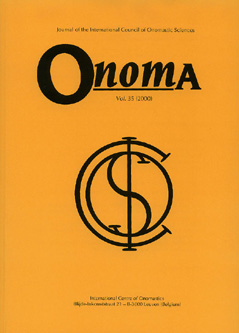 previous article in this issue previous article in this issue | next article in this issue  |

Preview first page |
Document Details : Title: African and European Anthroponymic Systems Subtitle: Similarities and Differences Author(s): SAARELMA, Minna Journal: Onoma Volume: 44 Date: 2009 Pages: 191-217 DOI: 10.2143/ONO.44.0.2143408 Abstract : This article analyses African and European anthroponymic systems from a historical and systematic viewpoint. What are the differences between African and European personal naming, and what do they have in common? How have these anthroponymic systems developed over time? Have similar socio-cultural developments, such as Christianisation and urbanisation, caused similar changes in these systems, or have they been affected by such changes in different ways? It has often been claimed that the main difference between the African and European concept of name is that in African cultures, the name and the person are inseparable, i.e. the name is the person, whereas in Europe, the name is a mere label which refers to the person. Another criterion frequently offered is that of name meaningfulness. It is typically stressed that African names carry semantic import, whereas in Europe, names are largely devoid of meaning for modern speakers. However, a closer analysis of both traditional and modern naming systems in Africa and Europe shows that the crucial difference does not lie between these cultural areas, but between pre-Christian and Christian naming on the one hand, and between traditional and modern naming on the other. Thus, there are no fundamental differences between African and European personal naming as such. Rather, it seems that personal naming follows similar patterns in all human cultures, and the differences that occur at a certain time, can best be explained by different socio-cultural developments in the society. Cet article analyse les systèmes antroponynymiques africains et européens d’un point de vue historique et systématique. Quelles sont les différences et points en commun dans le domaine du nommage en Europe et en Afrique? De quelle manière ces systèmes antroponymiques ont-elle évolué au cours du temps? Est-ce que les développements socio-culturels similaires tels la christianisation et l’urbanisation ont produit des changements similaires dans ces systèmes, ou trouvons nous des différences dans ces changements? Il a souvent été dit que la principale différence dans la notion du nom dans les cultures africaines et européennes s’éxplique par le fait que dans les cultures africaines, le nom et la personne sont inséparables, c’est à dire, le nom est la personne, tandis qu’en Europe, le nom n’est qu’un signe qui fait référence à la personne. Un autre critère souvent proposé est celui de la signification du nom. Il est typique d’insister sur l’importance sémantique des noms africains et de prétendre d’ailleurs qu’en Europe, les noms, pour un locuteur moderne, sont vidés de leur signification. Cependant, une analyse plus profonde des systèmes de nommages traditionnels et modernes en Afrique et en Europe révèle que la différence décisive ne se situe pas entre ces domaines culturelles, mais entre le nommage pré-chrétienne et chrétienne, et d’ailleurs entre le nommage traditionel et moderne. Ainsi, il n’y a pas de différences fondamentales dans le nommage africain et européen en tant que tel. Il paraît plutôt que le nommage des personnes s’effectue selon des modèles similaires dans toutes les cultures humaines, et les différences qui apparaîssent à un moment donné s’expliquent mieux par les différents changements socio-culturels dans la société. Dieser Artikel analysiert afrikanische und europäische anthroponymische Systeme von einem historischen und systematischen Standpunkt aus. Welche Unterschiede und Gemeinsamkeiten weisen afrikanische und europäische Personennamen auf? Wie haben sich diese anthroponymischen Systeme entwickelt? Haben ähnliche soziokulturelle Entwicklungen wie die Christianisierung und Urbanisierung ähnliche Veränderungen in diesen Systemen bewirkt, oder wurden diese in unterschiedlicher Weise von solchen Veränderungen beeinflusst? Oft wurde behauptet, dass der Hauptunterschied zwischen dem afrikanische und dem europäischen Namenskonzept der sei, dass in afrikanischen Kulturen der Name und die Person untrennbar miteinander verbunden seien, d.h. dass der Name die Person sei, wohingegen in Europa der Name eine reine Kennzeichnung sei, die sich auf die Person bezieht. Ein anderes Kriterium, das gern angebracht wird, ist das der Wichtigkeit von Namen. Es ist ein vielbemühtes Argument, dass afrikanische Namen semantische Bedeutung besitzen, während in Europa Namen für moderne Sprecher weitgehend frei von Bedeutung seien. Bei näherer Betrachtung des traditionellen wie des modernen Benennungssystems in Afrika und Europa zeigt sich jedoch, dass der ausschlaggebende Unterschied nicht zwischen kulturellen Gebieten, sondern zwischen vorchristlicher und christlicher Namensgebung auf der einen und zwischen traditioneller und moderner Namensgebung auf der anderen Seite liegt. Demnach gibt es keine fundamentalen Unterscheide zwischen afrikanischer und europäischer Namensgebung als solcher. Vielmehr scheint es, dass persönliche Namensgebung in allen menschlichen Kulturen ähnlichen Mustern folgt und dass die Abweichungen, die zu bestimmten Zeiten vorkommen, am besten mit einer unterschiedlichen soziokulturellen Entwicklung in der Gesellschaft erklärt werden können. |
|


